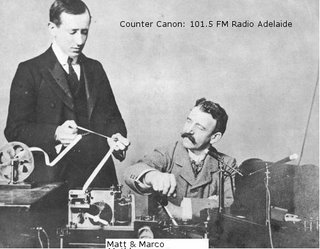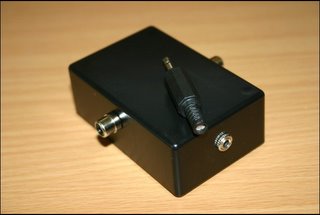Stephen Whittington
 So today we listened to Stephen talk about Stephen and this is what I learnt.
So today we listened to Stephen talk about Stephen and this is what I learnt.He has an interest in globalisation and sees views it as a process whereby human consciousness expands outside of its normal geopolitical boundaries (which are at the same time geographic and cultural - no disagreement here) and becomes" integrated on a global scale" (24/05/06).
I too view globalisation as the same process, however, when I think about it, i can't help but view it in a less celebratory frame. It's not so much the integrations of consciousness on a global scale, but the enforced implementation of a white, male, technological hegemony through capital and self interest. The positive of spin of globalisation is that it brings down borders, the negative is that it allows the powerful to take advantage of the weak on a global scale. I find it hard to hold on to a utopic vision of globalisation.
Next, Stephen discussed his appreciation of sound poetry and all the things in between. Its perhaps not a strict music technology area, but certainly the technology helps to realise it. I too like poetry, so thumbs up here. Here's something useful: an utterance is something which comes out of your mouth on a scale in between intelligible and non-intelligible (ibid). An interesting area, i think some of Karl Schwitter's work would have been an appropriate aid here, Ursonata is it called? (it certainly would have woken people up).
Distributed performance is another area of Stephen's interest. It involves performance where the performers are not in close proximity to each other, where they are distributed through space. Obviously this area of interest ties in neatly with the idea of globalisation. Another approach might be the sound of factories and sweatshops all over Asia, simultaneously sounding the triumphant toot, whurr and buzz of exploitation. Now that is true synchronicity, which, according to Karl Jung via Stephen is "how things are related to each other simply by occupying the same moment in time".
Synchronicity is another area of interest for Stephen. Once he recorded 21 minutes of improvisation at the same time as two other people. One was in Perth and the other was is Sydney. It must have felt strange. As I type, so too do a good few other people in the world. Unfortunately though, we have not contacted each other yet. One possibility may be to surf the web looking for things with the same time/date stamp - maybe that's my ticket!











